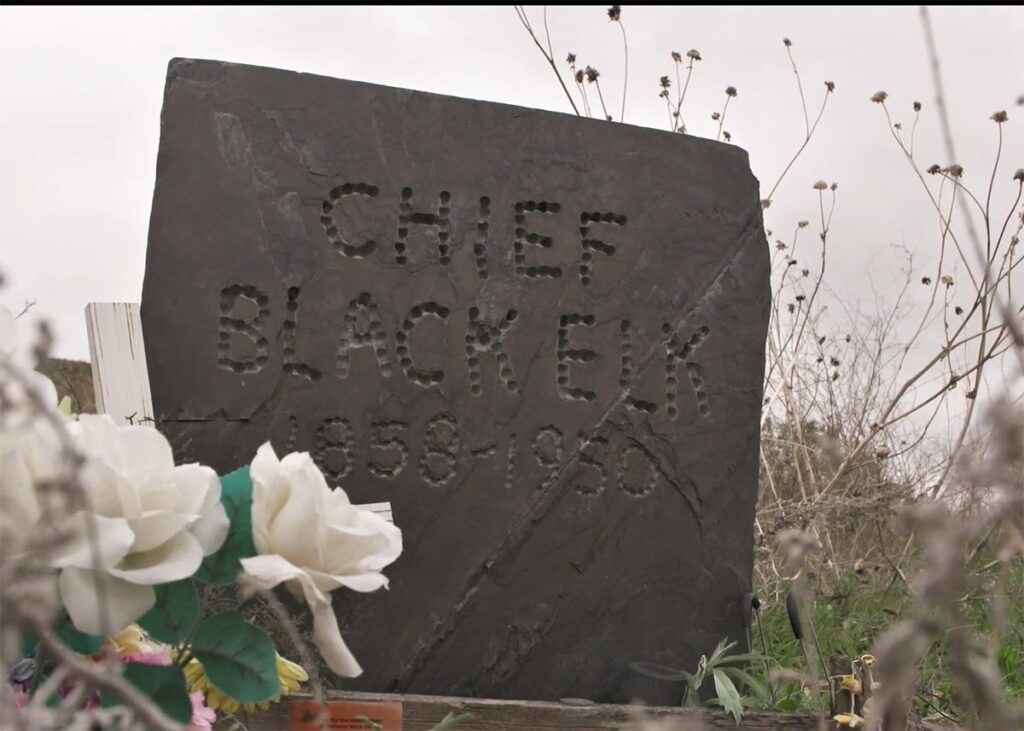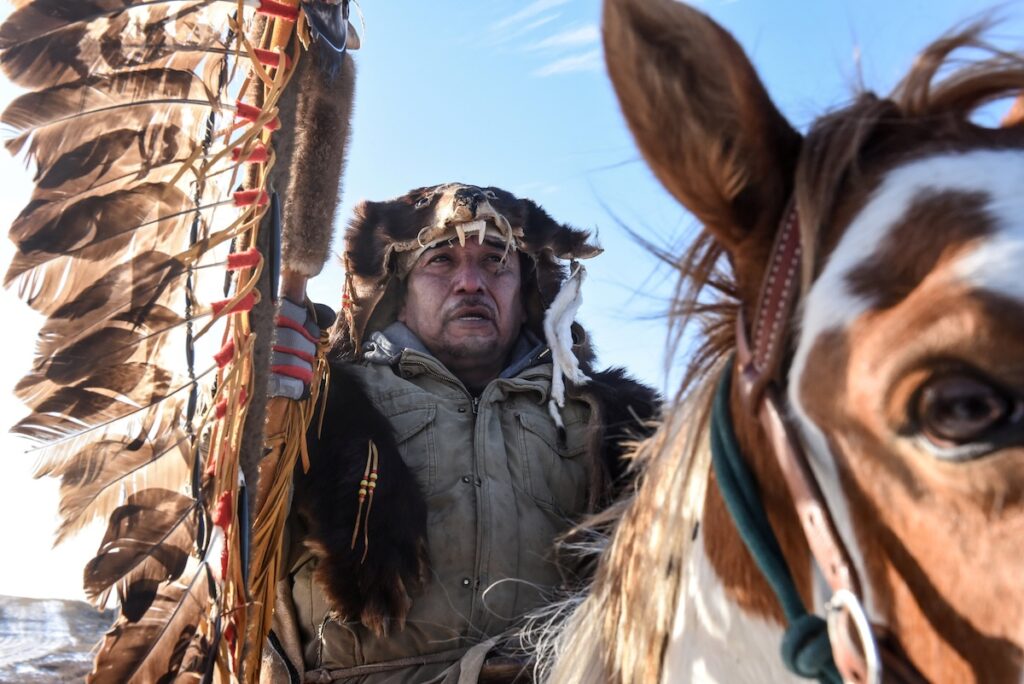(OSV News) — A South Dakota bishop and a Jesuit community in that state have countered a recent decision by the nation’s top defense official to retain awards for soldiers who killed hundreds of Indigenous civilians in a late 19th-century attack.
Bishop Scott E. Bullock of Rapid City and the De Smet Jesuit Community of West River issued an Oct. 20 statement on the matter titled “A Faithful Response to the Wounded Knee Decision.”
“If we deny our part in history, we deepen the harm,” wrote Bishop Bullock and the Jesuit priests in their message, which was posted to the Diocese of Rapid City’s website. “We cannot lie about the past without perpetuating injustice and moral blindness.”
Along with Bishop Bullock, the message’s signatories included five Jesuit priests from the order’s De Smet community — Father L. Ryen Dwyer, Father Edmund Yainao, Father Phillip Cooke, Father David Mastrangelo and Father Peter J. Klink — who have extensive experience in serving the Lakota communities (sometimes referred to as “Sioux,” from the French-Canadian name broadly applied to three linguistically and regionally different groups).
The signatories called for a reckoning with the attack “grounded in truth, conscience, and compassion.” They noted, “We acknowledge the government’s intent to honor its troops, yet we reject any narrative that erases the humanity of the victims or glorifies acts of violence.”
Recent announcement about Medals of Honor prompts statement
The statement is a response to a recent announcement by Secretary of War Pete Hegseth (who uses the secondary title for the secretary of defense authorized since Sept. 5) that 19 “brave soldiers” who participated in the massacre at Wounded Knee, South Dakota, should keep their Medals of Honor, the nation’s highest military decoration.
In a minute-long video posted to X Sept. 25, Hegseth held up what he said was a report commissioned in July 2024 by his Biden administration predecessor, Secretary of Defense Lloyd J. Austin III, which sought a reexamination of the medals’ bestowal at Wounded Knee.
Such a reexamination was not unprecedented: From 1916-1917, an Army board conducted an audit of the Medal of Honor that saw 911 recipients removed from the rolls.
Hegseth claimed that Austin’s panel had “concluded that these brave soldiers should, in fact, rightfully keep their medals from actions in 1890.”
However, The Associated Press stated Sept. 25 that a defense secretary official “couldn’t say if the report” Hegseth referenced in the video “would be made public.”
Austin himself had not issued a final decision on the Wounded Knee medals since, Hegseth claimed, “he was more interested in being politically correct than historically correct.”
The events at Wounded Knee in 1890
While Hegseth referred to the Dec. 29, 1890, events at Wounded Knee as a “battle,” historians and analysts more commonly describe them as a massacre amid systematic U.S. efforts to forcibly relocate and assimilate Indigenous peoples.
Days before the mass killing at Wounded Knee, the famous Lakota leader Sitting Bull had been shot dead, and a group of Lakota — mostly women, children and elders led by Chief Spotted Elk — were seeking refuge amid winter and a lack of food. Fighters among the group had already surrendered to the U.S. Army.
After soldiers attempted to disarm them, gunfire broke out and a massacre ensued, leaving an estimated 200-350 Lakota men, women and children dead. An undated National Park Service brochure notes that then-Col. (and later Maj. Gen.) James W. Forsyth, who led the 7th U.S. Cavalry in the attack — which saw some 200 rounds fired per minute — was reported to have shouted, “For God’s sake, stop shooting them.”
The bodies of the slain Lakota were buried in a mass grave. In 1973, the site — located on the Pine Ridge Reservation — was occupied for 71 days by hundreds of Native American activists protesting corruption in tribal leadership as well as the failure of the U.S. government to honor multiple treaties with Native nations.
Nicholas Black Elk, a survivor of the massacre who sustained injuries and aided victims, later became Catholic and a lay catechist. Black Elk, a servant of God, is now a candidate for sainthood.

One hundred years after the killings, Congress issued an apology to victims’ descendants, but retained the medal designations for the soldiers.
In September 2022, the Oglala and Cheyenne River Sioux tribes purchased 40 acres of the land including the Wounded Knee site, agreeing to ask the U.S. Department of the Interior to hold the land in trust on their behalf, with the title to be in the name of the Oglala Sioux.
Hegseth declared in his video that the soldiers’ “place in our nation’s history is no longer up for debate,” adding, “We salute their memory, we honor their service, and we will never forget what they did.”
But, said Bishop Bullock and the De Smet Jesuits, “to recognize these acts as honorable is to distort history itself.”
They stressed that “the facts of the tragedy at Wounded Knee Creek on December 29, 1890, are clear.
“On that day, U.S. Army soldiers massacred nearly 300 Lakota women, children, and unarmed men. This was not a battle,” they wrote.
They noted that Army Gen. Nelson A. Miles, writing in 1891 just days after the killings, described the Wounded Knee massacre as “the most abominable, criminal military blunder and a horrible massacre of women and children.”
In 1917, Miles repeated his condemnation of the attack in a letter to the Commissioner of Indian Affairs, describing the events at Wounded Knee as “most reprehensible,” “most unjustifiable,” and “worthy of the severest condemnation.”

Statement: ‘Moral responsibility to remember and speak the truth’
Bishop Bullock and the De Smet Jesuits highlighted that their response to Hegseth “is rooted not in ‘political correctness’ but in prayerful correctness, grounded in truth, conscience, and compassion.”
Citing their “lived experience with the Lakota people — and the hope they embody,” they said, “we firmly reject Secretary Hegseth’s decision.”
They endorsed an “overwhelmingly approved” 2024 resolution by the South Dakota Senate determining the Medal of Honor is degraded by its application to the soldiers at Wounded Knee.
Quoting the resolution, they said allowing the medals to stand “is an implication of hostility and genocide against the Great Sioux Nation and the persons who were killed by the United States at Wounded Knee.”
In their statement, Bishop Bullock and the De Smet Jesuits said that “as Catholics and followers of Jesus Christ, we proclaim the infinite dignity of every human life,” adding that humanity is both “capable of love and goodness” and “also capable of terrible evil.”
“Those who died at Wounded Knee are sacred. Jesus stands with all who suffer and die at the hands of others,” they wrote. “Those who committed the violence are also sacred; for this reason, Jesus offers them mercy and healing. Yet the acts themselves were grave evils and cannot be honored.”
And, they added, “Even if we are not personally responsible for Wounded Knee, we bear a moral responsibility to remember and speak the truth.”
They urged choosing, like Jesus, “to stand with our brothers and sisters, walking together in truth, remembering the victims, and seeking reconciliation rooted in honesty and compassion.”
“Only by facing the cross of our shared history can we move toward resurrection — a future of just and lasting peace for all God’s beloved children,” they wrote.
Gina Christian is a multimedia reporter for OSV News. Follow her on X @GinaJesseReina.
The post Bishop, Jesuits reject Hegseth decision to honor soldiers who massacred Lakota at Wounded Knee first appeared on OSV News.




